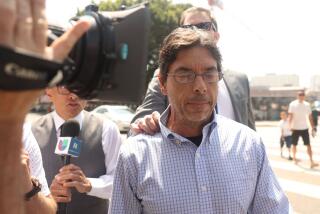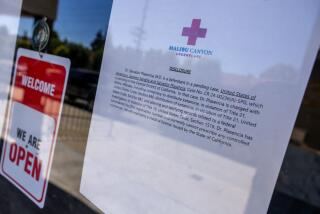Former Doctor Finally Begins His Sentence
- Share via
A controversial former doctor--accidentally allowed to remain free more than six years ago after being sentenced to state prison for selling cancer patients a potion consisting primarily of water and fecal bacteria--finally began serving his sentence Tuesday, or at least a small part of it.
Bruce W. Halstead, 77, who sold the murky “nutritional supplement” he called “ADS” to at least 10 patients at his Compton clinic for $125 to $150 a liter, was ordered Tuesday by a Superior Court judge to remain in jail until May 12, when he will be released from custody.
Halstead--long known worldwide for his expertise in animal toxins, according to his attorneys and supporters--was convicted in 1985 of 24 counts of cancer fraud and grand theft. Sentenced ultimately to 32 months in state prison, he launched a lengthy appeals process, first in state courts and then in federal courts.
The appeals failed, but lawyers say federal officials never handed down the order that would have required him to start serving his sentence. Halstead remained free, reporting faithfully once a week to a federal pretrial service officer who apparently never wondered why his charge hadn’t been sent to prison.
“I’d always thought the federal courts were more on the ball than we are,” said Deputy Dist. Atty. Hyatt Seligman, who successfully prosecuted Halstead back in 1985. “This shows they can screw up too.”
Halstead’s attorneys say that during his years of freedom, the doctor continued his work on animal toxins, eventually landing an important Department of Defense contract to develop a computerized bank of toxin research data to provide doctors with instant access to the latest information on the subject.
*
Finally, last summer, after Halstead offered expert scientific testimony during a trial in Orange County, a prosecutor there called the Los Angeles County district attorney’s office to inquire about his background. That’s when Seligman learned to his amazement that the tall, dignified-looking defendant had never been imprisoned.
After several months of legal maneuvering, Halstead was taken into custody two months ago. Since then, prosecutors and defense attorneys had been mulling over the unusual case, preparing their arguments over what, after six apparently productive years, the appropriate sentence would be for a most unusual man.
No one argued Tuesday about the merits of the conviction--that was not at issue. What they looked at instead was the history of the man before and after crimes that even his attorney, Robert M. Hartmann, agreed deserved punishment.
Halstead, a 1948 medical school graduate known in the 1970s for championing the use of laetrile and other unconventional cancer therapies, was also well known for his extensive research on the effects of poisonous stings and bites and the best ways to treat them. Even prosecutors conceded that although his past was sometimes controversial, he had no run-ins with the law until 1985.
It was then that Halstead and three co-defendants--Garry David Middleton, an Australian entrepreneur; Alfred M. Dix, a retired broadcast engineer from Marina del Rey; and Robert A. Sanford, a Chatsworth contractor--were arrested and charged in the ADS case.
Middleton fled after being released on bail and was never prosecuted. Dix and Sanford pleaded guilty in the case and were both placed on probation.
Halstead--who described himself as an eclectic, holistic, alternative physician--served as his own attorney during his trial. He testified that he did not know the precise ingredients of ADS, but he believed the substance--which he described as a Japanese herbal tea--was a nutritional supplement that would benefit his patients’ health.
“I am [not] so stupid as to believe that I am curing cancer,” he told the jury. “What I am trying to do is provide support for the body.”
Seligman painted a different picture, describing Halstead as “a crook selling swamp water . . . to desperately ill patients.”
Chemical analysis showed the “tea” to be 99.94% water, with the remaining 0.06% a mixed sludge composed mostly of coliform bacteria, the kind that feed on human waste.
The prosecutor told the jury that even if Halstead did not directly say so, he had implied that he had a cure for cancer.
“You can’t tell me . . . that people were paying $150 a liter for ADS because it tasted 150 times better than Lipton tea,” Seligman said. “They were taking it to save their lives.”
*
The jury decided that the prosecutor was right, convicting Halstead of 24 counts Oct. 5, 1985. He was released on bail. Five months later, Superior Court Judge Marvin D. Rowen sentenced Halstead to four years in prison, giving him an opportunity to reduce the sentence by relinquishing his medical license, dropping his medical activities and giving up the title of “doctor.”
However, two months later, Halstead placed an ad in the Townsend Newsletter, which describes itself as “An Informational Newsletter for Doctors Communicating to Doctors.” In the ad, Halstead asked applicants to write to “Bruce W. Halstead, M.D.”
After reading the ad, Rowen formally imposed the full, four-year sentence, later reducing it to 32 months because of sentencing guidelines. Halstead appealed the verdict to the state and federal appeals courts. During the federal appeals process, Halstead was required to a report in, once a week, to a federal pretrial services officer. In 1991, Halstead’s final federal appeal was denied.
“He should have been ordered then to appear to begin serving his sentence,” Seligman said. “I don’t know what went wrong.”
Instead, Halstead remained free, “reporting regularly, they say, for almost seven years,” according to the prosecutor.
*
Witnesses called Tuesday on Halstead’s behalf testified that although his medical license was eventually revoked, he continued his toxicological research, eventually landing--along with an associate, Joseph Gennaro--the Defense Department contract.
Gennaro testified Tuesday that when it comes to animal toxins, “Bruce is the person you go to.”
Seligman--who did not dispute the characterization of Halstead’s toxicological expertise or the importance of that work--said he had always assumed Halstead had served his sentence. Seligman said he did not learn otherwise until he got the call from the Orange County prosecutor last summer.
On Feb. 4, Halstead was arrested. Because of his diabetes and other health problems, he has been confined since that time in the infirmary at County Jail.
On Tuesday, Hartmann argued that because of Halstead’s ill health, and because of his positive efforts while free, he should be released from custody without further penalty. The two months served since Halstead’s arrest in February “are punishment enough,” Hartmann said.
Seligman proposed another year in County Jail, suggesting that anything less might be considered “a vindication” for Halstead.
Los Angeles Superior Court Judge John H. Reid said that in making his decision, he was balancing the good work Halstead has done against the crimes of which he was convicted. The judge acknowledged concerns about Halstead’s health, but said he believed that “punishment is deserved” and shared Seligman’s concerns about perceived vindication.
Reid then ordered Halstead to remain in jail until May 12, when he will be released. “If you think he’s been vindicated, you’re wrong,” the judge said.
Both Hartmann and Seligman said they were satisfied with the decision.
More to Read
Sign up for Essential California
The most important California stories and recommendations in your inbox every morning.
You may occasionally receive promotional content from the Los Angeles Times.










